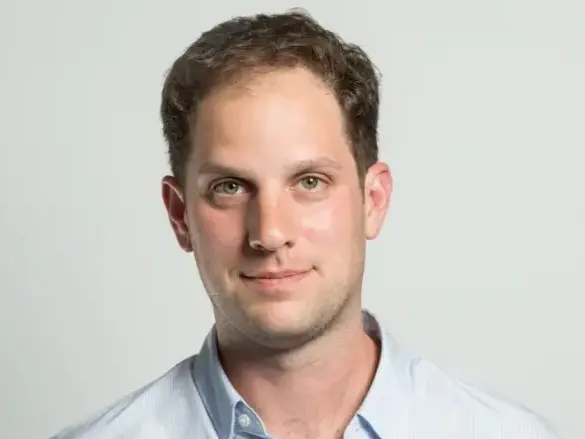
The Wall Street Journal is aiming to act as “an employer our employees want us to be” as it pushes for the release of reporter Evan Gershkovich one year on from his arrest in Russia.
Paul Beckett, formerly Washington bureau chief for the WSJ, initially worked informally on attempts to free Gershkovich but it became his sole responsibility when he was appointed assistant editor in the autumn.
US-born Gershkovich was arrested on 29 March 2023, while covering Russian mercenary group Wagner, on espionage charges firmly denied by the WSJ and the US. His pre-trial detention has repeatedly been extended, taking him up to the one-year mark this week.
Beckett told Press Gazette that despite its best efforts the WSJ is as “in the dark” about Russia’s reasoning for the arrest as anyone.
“The Russian system is so opaque,” he said. “We’ve seen no evidence, we’ve heard a few statements from the government, but otherwise, we’re in the dark.”
Asked about the 32-year-old’s state of mind, Beckett said: “He’s working very hard on staying okay. He’s a resilient young man. He meditates, he exercises, he writes letters, he reads, he plays chess with his father in Philadelphia.
“Dow Jones has lawyers who see him every week and see how he is doing.” Gershkovich is being held in Lefortovo prison in Moscow, where he spends 23 hours a day in a small cell.
‘We know we can’t solve this ourselves’
Beckett said that keeping up the efforts to secure Gershkovich’s release has required “every part of the news organisation”.
He said there were four pillars through which the WSJ, owned by News Corp’s Dow Jones, is sustaining support for its reporter.
“The first category is relations with the US government which is maintained by external lawyers and internal Dow Jones lawyers, because they will ultimately be the ones who get him out,” Beckett said.
“Secondly, for Evan, we try to provide practical and emotional support – even things you don’t think about like making sure his bank account and Google account remain active.
“Third is about being an employer our employees want us to be and ensuring that the newsroom is involved in efforts to keep him in the spotlight.
“Lastly, there is the broader awareness campaign because we know we can’t solve this ourselves.”
‘Every Dow Jones department involved’ in keeping spotlight on Gershkovich
Beckett added that the whole team is involved in keeping awareness up: “We’ve had to bring together so many WSJ departments to keep the spotlight shining.
“Every department at Dow Jones has probably touched this in one way or another, to varying degrees of course.”
For example to mark the one-year anniversary of his arrest, the WSJ is offering print adverts to papers that would like to run them. Similar ads were offered after Gershkovich was imprisoned for 100 days with, Beckett said, a significant response.
The editorial department created a page, sitting outside the usual WSJ paywall, with updates on Gershkovich’s case.
The hashtag #IStandWithEvan has helped spread awareness, with its usage growing each time Gershkovich appears in court.
Other journalists have also done their bit, Beckett added: “CNN anchor Jake Tapper interviewed Gershkovich’s parents and has tweeted daily about the efforts to get Evans home which has helped.”
Following Gershkovich’s arrest, the WSJ withdrew all its foreign correspondents from Russia. He was later named one of the 100 most influential people of 2023 by Time magazine.
Before joining the WSJ, Gershkovich worked at Agence France-Presse, The Moscow Times and The New York Times.
Email pged@pressgazette.co.uk to point out mistakes, provide story tips or send in a letter for publication on our "Letters Page" blog
